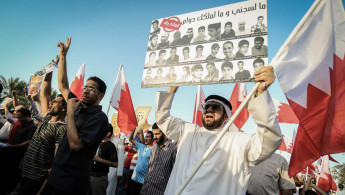Bahrain using US-Iran tensions to mask unjust executions, say activists
Amnesty and other human rights groups have long accused the kingdom of extracting false confessions from Mohammed Ramadan and Hussain Moosa under torture.
Ramadan and Moosa were arrested in 2014, and are known to have been interrogated under torture and without legal counsel.
They were convicted and sentenced to death in December that year for pre-meditated murder of a security officer by an improvised explosive device (IED) in January of that year, despite the absence of any physical evidence.
Comment: Bahrain follows US lead on executions
Maryam al-Khawaja, a leading human rights defender from Bahrain, told The New Arab that the retrial came after months of pressure from Bahraini human rights groups.
The subsequent upholding of the death sentences “can only be read as the Bahrain regime taking opportunity while the region is engulfed in the current situation between Iran and the US to sentence these men to death,” she said.
Twitter Post
|
The Gulf nation was previously accused of using holidays to avoid international condemnation over its human rights record, after it carried out the pair’s original sentencing on Christmas Day.
The pair have one level of appeal remaining, at Bahrain’s Court of Cassation. If the court upholds the convictions, the pair will be at “imminent risk” of execution, according to The Bahrain Institute for Rights and Democracy (BIRD).
“If the regional political climate remains as it is, it's difficult to be optimistic about the outcome, especially since the Court of Cassation has in the past upheld sentences of execution that were carried out against torture survivors," said al-Khawaja.
Ramadan and Moosa are both members of Bahrain’s Shia community, on which the authorities have launched a brutal crackdown since demonstrations in 2011 calling for democratic reforms in the Sunni-ruled kingdom.
Lynn Maalouf, Amnesty International’s Middle East Research Director, said Ramadan and Moosa, “should never have been convicted” due to their “fabricated” confessions having been obtained through torture.
“Despite the emergence of evidence from the Bahraini government itself supporting the defendants’ reports of torture, the court system has once again upheld the decision to put them to death,” she added, calling the case a “disturbing new precedent in Bahrain’s history of contempt for due legal process.”
Maalouf called on Bahraini authorities to overturn Ramadan and Moosa’s convictions and sentences, calling the death penalty “abhorrent in all circumstances, but its use is even more appalling when applied after an unfair trial.”
Comment: Bahrain's unending Shia repression
“Instead of condemning the victims of this irreparably flawed trial to death, they must hold to account those responsible for their torture and guarantee that the defendants receive reparations, rehabilitation, and an ironclad guarantee of non-repetition,” she added.
In July 2019, Bahrain executed two young men by firing squad after they were convicted of killing a police officer two years previously, despite campaigns by human rights groups and the UN, including its Special Rapporteur on extrajudicial, summary or arbitrary executions, Agnes Callamard.
Ali Mohamed Al-Arab, 25, and Ahmed Issa al-Malali, 24, were believed to have been forced to confess and to have faced an unfair trial.
Follow us on Twitter and Instagram to stay connected




 Follow the Middle East's top stories in English at The New Arab on Google News
Follow the Middle East's top stories in English at The New Arab on Google News
![The UAE is widely suspected of arming the RSF militia [Getty]](/sites/default/files/styles/image_330x185/public/2024-11/GettyImages-472529908.jpg?h=69f2b9d0&itok=Yauw3YTG)
![Netanyahu furiously denounced the ICC [Getty]](/sites/default/files/styles/image_330x185/public/2024-11/GettyImages-2169352575.jpg?h=199d8c1f&itok=-vRiruf5)
![Both Hamas and the Palestinian Authority welcomed the ICC arrest warrants [Getty]](/sites/default/files/styles/image_330x185/public/2024-11/GettyImages-2178351173.jpg?h=199d8c1f&itok=TV858iVg)